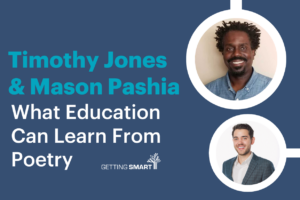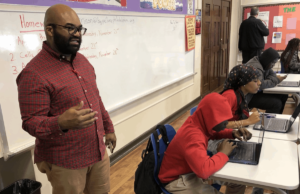Students Earn AA Degrees and Job Offers as Grads from IBM Supported High Schools

In 1974, LaGuardia Community College opened the first Middle College Program. Students took a combination of high school and college courses. The mature setting of a college campus and opportunity to earn college credit while in high school became a successful alternative model that spread to dozens of locations around the country.
Building on Middle College success and leadership from Bard High School Early College, the Gates Foundation, Dell Foundation, and Carnegie Corporation launched the Early College High School initiative in 2002. Eight partners supported by JFF set out to create 280 high schools where students could earn up to two years of college credit. A decade after foundation funding ended, the initiative has doubled in size, proved successful, and seems poised for growth.
In 2011 IBM infused work experiences and employment opportunities into the model and supported the development of Pathways in Technology Early College High School (P-TECH). With founding principal Rashid Ferrod Davis and in partnership with CUNY and City Tech, New York City Department of Education opened the first P-TECH school in Brooklyn. Six more P-TECH schools were opened in New York between 2013 and 2015. There are now 41 P-TECH across the state.
In the last nine years, the P-TECH initiative has grown to more than 110 schools in eight states and supported by over 500 business partners. They all focus on STEM fields and combine technology work experiences with the opportunity to earn an associate’s degree in high school.
With sixty-three P-TECH, (and about 200 Early Colleges), Texas has by far the most opportunities for high school students to earn college degrees. There are eighteen P-TECH in Dallas supported by 75 business partners. With seven more early colleges, the accelerated pathways are available as a school-within-a-school option in every attendance area.
MDRC recently released an evaluation of New York City P-TECH schools that showed that most students begin college coursework in tenth grade and that students accumulate more credits than students in other schools. They also take and pass New York state tests earlier and at higher rates than other students.
The evaluation also found that all of the P-TECH schools focus on workplace skills such as good work habits and interpersonal skills.
“It was gratifying to see that students were accumulating core and career and technical education credits more rapidly,” said Grace Suh, VP of Education at IBM. “It was great to hear that [P-TECH students] were scoring higher on the English Language Arts Regents tests.”
The schools are popular, they are all oversubscribed,” added Suh. “And students are earning degrees that matter.”
IBM has hired 35 of the early P-TECH graduates as designers and developers right out of the 9-14 program. “Many graduates want to go on to college,” said Suh. “We’re glad some of them have come back [to IBM] as well.”
The P-TECH website, supported by IBM, features tools and resources and highlights case studies from schools worldwide.
IBM, ISTE, and other partners launched Open P-TECH, free digital content on tech and professional skills including cloud computing, artificial intelligence, blockchain, data science, cybersecurity, and design thinking. Engaging videos and gamified assessments maintain learner interest. Digital badges provide a free way to demonstrate knowledge and skills as learners apply for employment or higher education.
P-TECH is the promise of high tech work experiences while gaining accelerated and affordable access to college. It’s an innovation that should be available to every high school student.
For more
Stay in-the-know with innovations in learning by signing up for the weekly Smart Update.





0 Comments
Leave a Comment
Your email address will not be published. All fields are required.